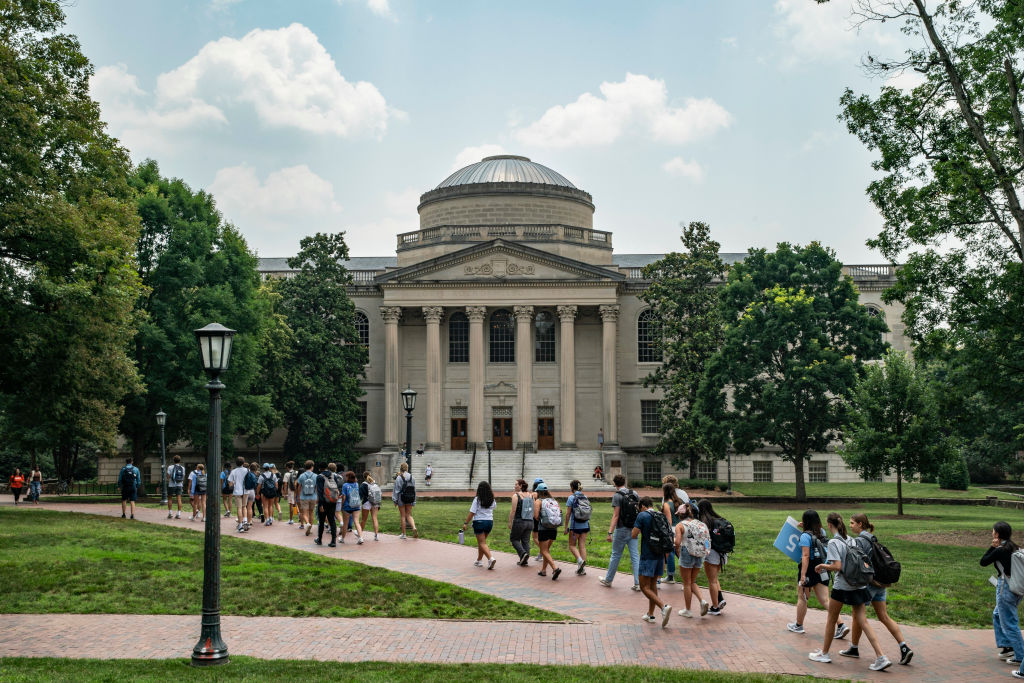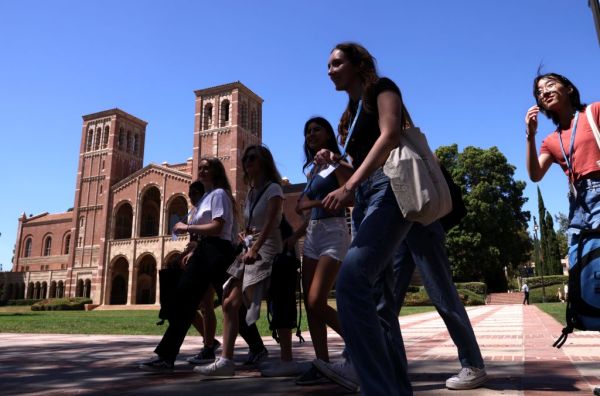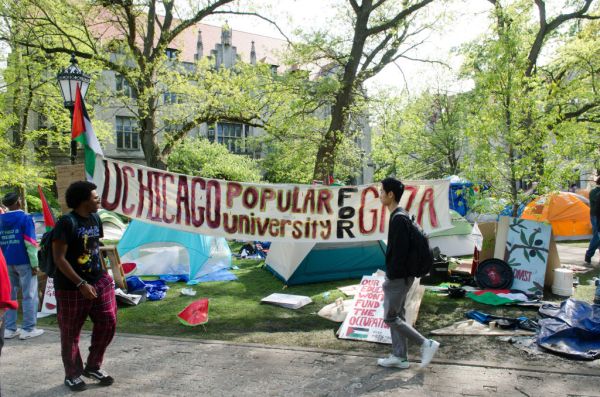“F— Marty Kotis! F— the board of trustees!”
Marty Kotis laughed. As chants rang out among nearly 60 pro-Palestinian campus protesters, the University of North Carolina at Chapel Hill trustee stood less than 30 feet away, recording video on his phone as the group surrounded the Old Well—a beautified outdoor drinking fountain recognizable as the school’s logo.
“Oh, that’s great,” he remarked, before ironically joining in the cries.
For nearly the entire afternoon of Saturday, May 11—commencement day for UNC’s class of 2024—Kotis had observed protesters led by the school’s then-newly suspended Students for Justice in Palestine (SJP) chapter as they slowly crossed UNC-Chapel Hill’s campus, rallying at different landmarks. Outside the South Building, UNC’s main administrative office, the group spilled red paint down the front entrance steps, using the leftover color to cover the facade in faux bloody handprints as others scribbled slogans.
Kotis kept his distance, monitoring—alongside university police—the demonstrators to ensure their vandalism was nothing maintenance crews would not be able to clean up quickly. Trying to avoid an inopportune run-in, he attempted to go unrecognized. However, as the marchers rallied at the Old Well in the early evening, an organizer spotted Kotis. The chants aimed at him soon broke out.
“I thought it was funny,” he told The Dispatch in a phone interview.
Kotis is used to the attention.
The May protest was neither the first nor last time the Greensboro-based real estate developer had drawn the scorn of student anti-Israel organizations. Weeks before the commencement day disruptions, protesters chanted, “Marty Kotis, you can’t hide. You’re funding a genocide.” Four days after the Old Well, they interrupted a public trustees meeting, castigating Kotis and others. Days after that, protesters paid visits to Kotis’ commercial properties in the Greensboro area, pasting stickers criticizing him and spray-painting pro-Palestinian graffiti, as evidenced by photos shared with The Dispatch.
At face value, Kotis, a mid-ranking administrator and budget committee vice chair for the board of trustees (BOT)—for which he receives no salary from the university—is not an obvious target for protests. A 1991 UNC graduate, Kotis spends most of his time managing his numerous real estate and hospitality ventures, including restaurants, a craft brewery, a cinema, and other venues. He also has an affinity for street art, commissioning numerous murals throughout Greensboro, and riding motorcycles, as apparent in a 2021 TEDx video.
However, Kotis is an unapologetic self-described “libertarian-leaning Republican.” An early and vocal supporter of conservative higher education policies since North Carolina’s GOP-dominated state legislature first appointed him to serve the state’s public university system in 2013, he has led efforts to eliminate affirmative action and diversity, equity, and inclusion (DEI) programs at UNC. Kotis’ positions and outspokenness, including recent pushback against the campus’s pro-Palestinian movement, have earned him support from a growing list of like-minded allies in Chapel Hill and sharp criticism from the university’s progressive majority students and faculty. As former GOP state legislator and trustee Rob Bryan told The Dispatch, conservatives at his alma mater “can expect to have their views challenged daily.”
Kotis—first appointed by the state’s General Assembly to a seat on the UNC system-wide board of governors (BOG) in 2013—took this, in a way, as a challenge. “I came in guns blazing,” he said. “There were a lot of 31–1 votes at first.” (The board at the time had 32 seats.) He took an early aim at academic tenure, arguing colleges should not appoint professors to lifetime positions before joining the faculty just as “people don’t get married on the first date.” While other board members did not see eye-to-eye with him, Kotis believes discussing the topic, among other contentious issues, improved the board’s dynamics.
“The culture of [UNC’s] governing boards has historically been: Everyone goes along unanimously with very little dissent or discussion,” Kotis said. “Since I arrived in 2013, we’ve had a lot more debates and members willing to challenge the status quo.”
While academic tenure remains, race-based admissions and DEI have been either outlawed or chipped away at since Kotis gained another legislature-allotted position as a UNC-Chapel Hill trustee in 2021. In November of that year, he proposed a resolution that read, “The University shall not discriminate against or grant preferential treatment to an individual, group or company on the basis of race, sex, color or ethnicity.” Trustees struck it down 13-2.
Kotis roots his opposition to race-based practices, such as affirmative action and DEI, in his day job. “In my time in business, everyone who applies for a position is treated the same regardless of their identity. I’ve ended up with a very diverse company as a result,” Kotis told The Dispatch. “That’s the way it should be. To treat anyone differently based on their race or gender is to discriminate.”
Bryan, who voted against the motion over concerns it was too vague, said that Kotis has shown a “robust willingness” to straightforwardly discuss his ideas with other board members regardless of popularity. “He has long been 100 percent true to his convictions and won’t shy away from representing his philosophy.”
Kotis’s philosophy has found legal and administrative backing since November 2021. The Supreme Court’s June 2023 dual decisions in Students for Fair Admissions (SFFA) v. Harvard/UNC ruled that affirmative action standards in admissions violated the Equal Protection Clause of the Constitution’s 14th Amendment. Kotis lauded the court’s ruling against UNC, mentioning his unsuccessful 2021 motion in a victory lap X post.
In May of this year, Kotis and other trustees expanded the fight against other race-focused standards, unanimously redirecting $2.3 million from UNC’s DEI program to campus safety initiatives in May, a direct reaction to the August 2023 on-campus murder of professor Zijie Yan by a disgruntled graduate student and disruptive pro-Palestinian protests late last semester.
In dramatic scenes that received national attention, protesters raised a Palestinian flag onto Chapel Hill’s main flagpole on the afternoon of April 30 after university police cleared an encampment they had set up on Polk Place. Campus cops led by Chancellor Lee Roberts and flanked by an army of fraternity brothers reraised the stars and stripes, leading to accusations of excessive force from demonstrators and other sympathetic groups. Police detained 36 protesters—only 13 of whom were UNC students—and the university officially suspended SJP on campus. In the aftermath, Kotis took to X, praising the university’s response and posting lyrics to the Star-Spangled Banner.
Over a week after the BOT’s move, the UNC system’s BOG repealed its policy requiring DEI positions at their public universities, echoing similar cuts at universities across the country. As of an official announcement made on September 11, the Chapel Hill campus leads the system’s 16 other institutions in DEI cuts, eliminating 20 positions and realigning 27.
Kotis partially acknowledges the influence of other states’ policies on UNC. “We have more in common with Florida and Texas than some other places in terms of our reform ideals, though we approach these issues somewhat differently,” he said.
Progressive Tar Heels—students, staff, and some alumni—see Kotis and UNC boards’ actions not simply as an answer to campus happenings, but as part of a nationwide long-game strategy to remake higher ed institutions in the right’s image.
“I wish Marty Kotis stayed in his lane,” said Jay Smith, a UNC history professor and North Carolina conference president of the American Association of University Professors (AAUP), a college faculty interest group. Smith told The Dispatch over the phone that trustees’ actions against DEI are part of a “slow-moving coup” in favor of conservative policies. “There is a coordinated assault on higher education,” Smith said, also pointing to proposed General Assembly bills, including one eliminating academic tenure, as evidence of political meddling in university affairs.
Conservative-leaning trustees have found their way to the BOT in recent years, including former Republican state Senate Minority Leader Patrick Ballantine and GOP strategist Jim Blaine. Two trustees, Dave Boliek and Brad Briner, are currently Republican nominees for state auditor and treasurer, respectively. Others, such as Chair John Preyer and hotelier Vinay Patel, have, like Kotis, donated hundreds of thousands to Republican causes in recent years, according to the Daily Tar Heel, UNC’s student newspaper.
Meanwhile, the campus activist scene has changed. Starting last academic year, leftist student groups—including the SJP—have joined forces to form the Southern Student Action Coalition (SSAC), a self-described “intersectional, intergenerational, and anti-imperialist” group. The SSAC’s front group, transparUNCy, has railed against UNC administrators for their DEI-critical positions. SSAC member organizations–which include the school’s Affirmative Action Coalition and March for Our Lives chapter—regularly share social media content, including from UNC’s SJP chapter.
With Tar Heels having returned to Chapel Hill since late August, SJP has shown no signs of slowing down despite their suspension, holding a rally attended by dozens of demonstrators during the first week of classes. That same week, the group’s Instagram page posted a video reading, “The resistance will win. The Zionist entity will fall,” before concluding with “Long live the Intifada.”
This past Thursday, the group organized a “Walk Out for the West Bank,” encouraging students to ditch class and march through campus. Approximately 150 did, some spray painting messages such as “Death to US” in the halls of academic buildings with further vandalism on the facade of the school’s ROTC Armory. In a scene reminiscent of last April, protesters also hoisted a Palestinian flag onto the ROTC’s exterior flagpole. Kotis told The Dispatch in a text message that the perpetrators “should be identified and held accountable.”
As the war in Gaza continues, the anniversary of Hamas’s October 7 attack on Israel approaches, and North Carolina holds battleground status this election cycle, Kotis fears more incidents could be on the horizon. But he hopes increased campus public safety measures bolstered by the more than $2 million in redirected funding will allow the university to respond efficiently.
As tensions remain on campus, Kotis does not intend to stop speaking out or to stay “in his lane.” “I’m not sure what lane [Smith] thinks I’m supposed to be in,” Kotis said. “But I’m pretty confident I’m doing the job that I’m supposed to do.”









Please note that we at The Dispatch hold ourselves, our work, and our commenters to a higher standard than other places on the internet. We welcome comments that foster genuine debate or discussion—including comments critical of us or our work—but responses that include ad hominem attacks on fellow Dispatch members or are intended to stoke fear and anger may be moderated.
With your membership, you only have the ability to comment on The Morning Dispatch articles. Consider upgrading to join the conversation everywhere.